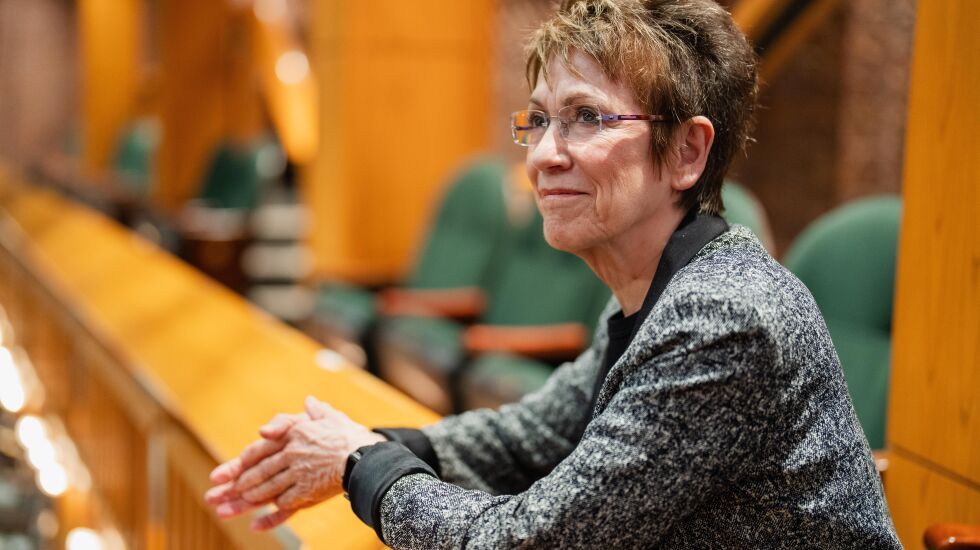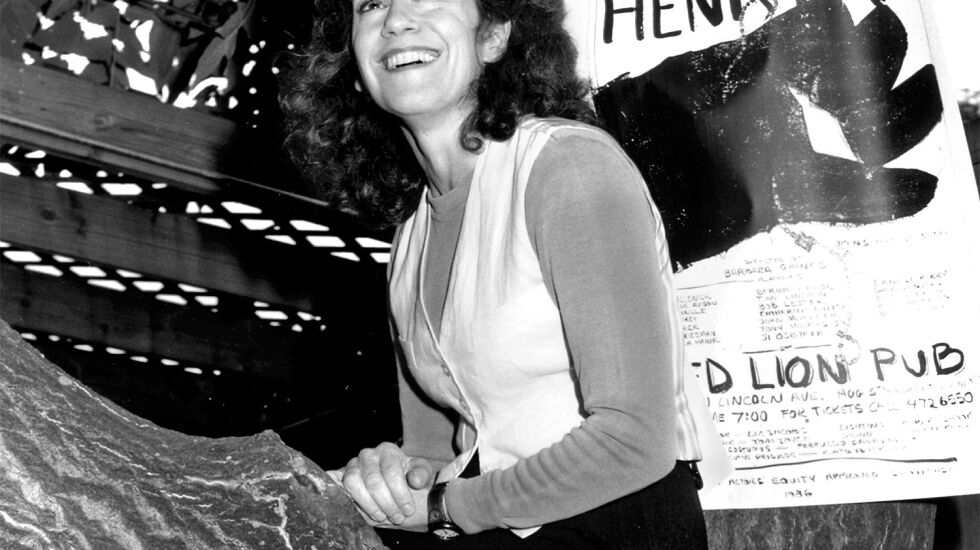
In 2019, Barbara Gaines decided it was just about time to pass the torch. After 35 years as the artistic director of Chicago Shakespeare Theater, she set 2020 as the year she’d step down from the spot she’d held since founding the company in 1986.
The best-laid plans.
“It’s been a long goodbye, thanks to the pandemic,” Gaines said from the CST’s sprawling seven-story, three-theater, roughly $57 million Navy Pier complex, where breathtaking, panoramic views of the skyline glitter from lobbies, the restrooms and the office Gaines often shares with Cricket, her Goldendoodle.
She’s felt two prevalent emotions as the days ticked down to her June 30 farewell as CST’s founding artistic director.
“My feelings are primarily sadness dominated by overwhelming gratitude,” Gaines said during a recent chat at the theater. “I was given this insanely magnificent gift of exploring Shakespeare for the past 37 years. Of living out what was inside my imagination. How many people get to do that?
“I’m sad to be leaving the staff here — that will hurt. But I won’t miss the load that any artistic director — no matter how big or small [the theater] — has to carry. The fundraising — I won’t miss that pressure. Now I can pour all my energy into the art,” she said.
Chicago Shakes, as it is colloquially known, is by any measure on the “big” end of the theatrical scale. Pre-pandemic, the theater estimates it welcomed roughly a quarter of a million audience members annually to its stages.
Gaines also kept young audiences forefront in mind throughout her tenure. In addition to bringing shows like “Peter Pan” and “The Wizard of Oz” to the Pier, she started “Short Shakespeare” programming, which sent abridged versions of “Midsummer Night’s Dream” and “Romeo and Juliet,” among others, to neighborhood parks and some 400 schools where they engaged with more than 40,000 students.
She didn’t stop at the boundaries of Chicago. Gaines took numerous productions to London — Stephen Sondheim’s “Pacific Overtures” (2003, directed by Gary Griffin), which played at the Donmar Warehouse and won three Olivier Awards; “Henry IV” Parts 1 and 2 (2006); and partnerships with the Chicago hip-hop/theater collective Q Brothers, among them — all while keeping the stages on the Pier bustling.
Sometimes the work was epic and audacious: The six-hour “Rose Rage” merged three plays — “Henry V” and “Henry IV” Parts 1 and 2 — into a single, enthralling entity. The sci-fi musical “It Came From Outer Space” was profoundly silly and inarguably entertaining.

Shakespeare was ever the driving force — whether it was Larry Yando as a 21st-century “King Lear” (2014), or Ross Lehman declaiming “all the world’s a stage” to heartbreaking impact in “As You Like It” (2010) — the playwright’s words came to life at CST.
The current season has 11 productions programmed and a $16 million operating budget. In 2020 — the latest year figures are available — Chicago Shakespeare estimated its “Permanent Economic Impact in Chicago” soared north of $31 million annually.
Those numbers belie the initial reaction Gaines encountered when she returned to Chicago from New York City in the mid-1980s, intent on leaving her acting career behind and establishing a world-class Shakespeare company for Chicagoans.
“Guffaws,” Gaines recalled. “People laughed. Literally. I heard Chicago didn’t want Shakespeare, wouldn’t support it.
“I remember being stopped on Michigan Avenue by a gentleman who was prominent with the theater community here — a producer, a funder.

“I was telling him my dream and he literally laughed at me. He said Tyrone Guthrie had tried it in Chicago in 1930s, but gave up and went to Stratford (Ontario, Canada) instead.
“After that conversation I started thinking, well, proving him wrong would be really exciting,” Gaines said.
Gaines began amassing proof in 1986, with a showcase of monologues, scenes and sonnets. She talked to Second City’s then-executive producer Joyce Sloane into loaning her the comedy venue’s e.t.c. space on an off night, invited a who’s who of Chicago theater movers-and-shakers, and tied the show’s segments together with a score that ranged from Beethoven to Randy Newman.
She passed a hat and collected some $5,000 in donations — enough to seed her next endeavor, “Henry V.” With the help of a nascent board, Gaines put the epic history play — Battle of Agincourt and all — on the roof of the Red Lion Pub.
“It never rained on us,” she recalled. “Not once. And the audiences were amazing.”
Gaines began planning her next show, “Troilus and Cressida.”
“I was burning, bursting with ideas,” Gaines said. “I had so many dreams and images in my head, if I hadn’t had an outlet, you would have had to put me in a padded cell.”
With a board of generous funders in place, Gaines kept elevating, eventually moving from the rooftop to the Ruth Page Center for the Arts, where Chicago Shakespeare Theater stayed until the Navy Pier venue was completed in 1999 with the help of some $23.2 million in funding from the city.

The morning in 1999 when the theater’s Navy Pier marquee went up — a towering neon sign that blinks in a rainbow of colors and can be seen from Lake Shore Drive — Gaines got there at 5:30 a.m. to watch the massive letters hoisted skyward as the sun rose over the lake.
“I looked at the lights radiating out over the city and I thought ... I want Shakespeare — his art, his words — to radiate across the city like those lights.”
At the time, Chicago Shakespeare boasted two theaters: the 500-seat Courtyard Theater and the Theatre Upstairs, which seats 200. In 2018, a $35 million expansion brought The Yard to CST, a flexible space that can seat between 150 and 850, depending on the seat configuration.

The expanded footprint allowed Gaines to bring in shows from across the globe, and to produce numerous non-Shakespeare works. Among the hits that first saw life on the Pier: “Six” (2019), which became a Tony Award-winning smash on Broadway, and the world premiere of Stephen Sondheim’s last musical, “Road Show” (2014).
The expansion also allowed her to bring in more collaborators. Among them: Tyrone Phillips, who makes his mainstage directorial debut this fall with “Twelfth Night.”
“I love how personal [Barbara] makes these plays,” said Phillips. “She really celebrates the human nature in the script. She comes from a place of joy and celebrating what the moment means with a lot of generosity and specificity. She’s always asking why are we telling this story now? What are we giving the audiences that’s relevant? She takes nothing for granted,” he said.
Gaines invokes a decadent dessert in explaining her drive to expand CST programming well beyond the works of the Shakespeare.

“He’s like chocolate mousse,” Gaines said. “So, so rich. I love Shakespeare, but you can’t have chocolate mousse all the time. You need to have other things as well.”
Gaines may be stepping down from CST leadership but she’s hardly slowing down. Next up: “Sinister,” a prequel to “Macbeth” that she’s working on with the playwright Lauren Gunderson. She’s also prepping to direct an as-yet unannounced opera at Lyric Opera of Chicago.
But ask Gaines to name a CST accomplishment she’s most proud of and she resolutely demurs. Her mom was especially fond of the Order of the British Empire ribbon, she finally said, adding that CST’s regional Tony has a special spot in the theater, as do the myriad Jeff Awards the company has collected over the years.

Gaines says the most-valued accomplishments lie not in the 60 productions she’s personally directed but in the people she worked with and befriended.
“The friendships I’ve been able to have as a result of this theater are the most important thing,” she said. “In my heart, that’s what hold as close as anything. The art is secondary in a way to all the lovely, generous, passionate souls I’ve had the honor of working with. And I do mean honor,” she said.
The board of trustees this week officially declared that Barbara Gaines would hold the official title of Founder of Chicago Shakespeare Theater.








